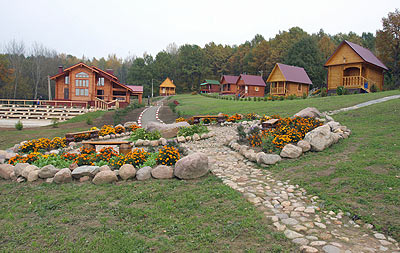Ru
|
Eng
UNDP to provide $450,000 to finance Belarus’ local eco-tourism initiatives
12.12.2013

The United Nations Development Programme (UNDP) will provide $450,000 to finance Belarusian local eco-tourism initiatives, Alexander Tarasenok, the ecotourism adviser of the Local Entrepreneurship and Economic Development Project of the United States Agency for International Development (USAID) of the UNDP, said during a workshop on the sustainability of eco-tourism business in Grodno on 12 December, BelTA has learnt.
The UNDP will give 30 mini-grants, $15,000 each. Alexander Tarasenok informed that the contest of local initiatives is open already, and over 90 applications have already been submitted. The contest is expected to create a stable eco-tourism infrastructure in Belarus and support projects that would promote the development of tourism destinations approved by the UNDP.
The work on the documents for 17 tourism destinations (10 in Grodno Oblast and 7 in Brest Oblast) is almost completed. “It is too early to predict how these destinations will be developing in the future. We view eco-tourism as a form of sustainable natural resource management which, on the one hand, is not as harmful for the environment as forestry or hunting and, on the other hand, combines sustainable use of natural resources with economic development of the regions. We expect that the development of eco-tourism will reduce migration from remote areas. And it is important that the initiative should come from entrepreneurs,” Alexander Tarasenok said.
Alexander Tarasenok also believes that it is important to make several amendments to the Belarusian laws regarding eco-tourism, in particular, Decree No. 372 on measures for developing agro- and eco-tourism in the Republic of Belarus. The country should create the most favorable conditions for business in the rural areas, especially on the territories with unique natural landscapes. At the same time it is necessary to distinguish eco-tourism from pseudo eco-tourism when entrepreneurs set up hotels and recreation facilities in suburban areas and call them agro-eco-farmsteads. All in all, the experts of the project have suggested more than 20 amendments to the Belarusian laws related to eco-tourism.
Alexander Tarasenok also informed that the USAID Local Entrepreneurship and Economic Development Project jointly with the National Statistical Committee of the Republic of Belarus will work out methods of statistical accounting in the field of tourism and test them. This will help provide objective evaluations of tourist flows including tourists and other visitors to tourism destinations.
Besides, the project provides for the eco-tourism staff professional training in marketing, management, sustainable tourism, interpersonal communication, and small and middle-size business economics. In February 2014 a contest for business representatives will be announced. The winners of the contest will participate in 40 workshops on 14 fields of eco-tourism business and will make training trips to the EU countries. Special computer and language courses will be organized for the owners of farmsteads and other people involved in eco-tourism.
The UNDP will give 30 mini-grants, $15,000 each. Alexander Tarasenok informed that the contest of local initiatives is open already, and over 90 applications have already been submitted. The contest is expected to create a stable eco-tourism infrastructure in Belarus and support projects that would promote the development of tourism destinations approved by the UNDP.
The work on the documents for 17 tourism destinations (10 in Grodno Oblast and 7 in Brest Oblast) is almost completed. “It is too early to predict how these destinations will be developing in the future. We view eco-tourism as a form of sustainable natural resource management which, on the one hand, is not as harmful for the environment as forestry or hunting and, on the other hand, combines sustainable use of natural resources with economic development of the regions. We expect that the development of eco-tourism will reduce migration from remote areas. And it is important that the initiative should come from entrepreneurs,” Alexander Tarasenok said.
Alexander Tarasenok also believes that it is important to make several amendments to the Belarusian laws regarding eco-tourism, in particular, Decree No. 372 on measures for developing agro- and eco-tourism in the Republic of Belarus. The country should create the most favorable conditions for business in the rural areas, especially on the territories with unique natural landscapes. At the same time it is necessary to distinguish eco-tourism from pseudo eco-tourism when entrepreneurs set up hotels and recreation facilities in suburban areas and call them agro-eco-farmsteads. All in all, the experts of the project have suggested more than 20 amendments to the Belarusian laws related to eco-tourism.
Alexander Tarasenok also informed that the USAID Local Entrepreneurship and Economic Development Project jointly with the National Statistical Committee of the Republic of Belarus will work out methods of statistical accounting in the field of tourism and test them. This will help provide objective evaluations of tourist flows including tourists and other visitors to tourism destinations.
Besides, the project provides for the eco-tourism staff professional training in marketing, management, sustainable tourism, interpersonal communication, and small and middle-size business economics. In February 2014 a contest for business representatives will be announced. The winners of the contest will participate in 40 workshops on 14 fields of eco-tourism business and will make training trips to the EU countries. Special computer and language courses will be organized for the owners of farmsteads and other people involved in eco-tourism.
SCIENCE. TECHNOLOGY. INNOVATIONS
13.08.2024
28.06.2024
28.06.2024
25.06.2024
05.06.2024
15.05.2024
15.05.2024
26.04.2024
26.04.2024
26.04.2024













